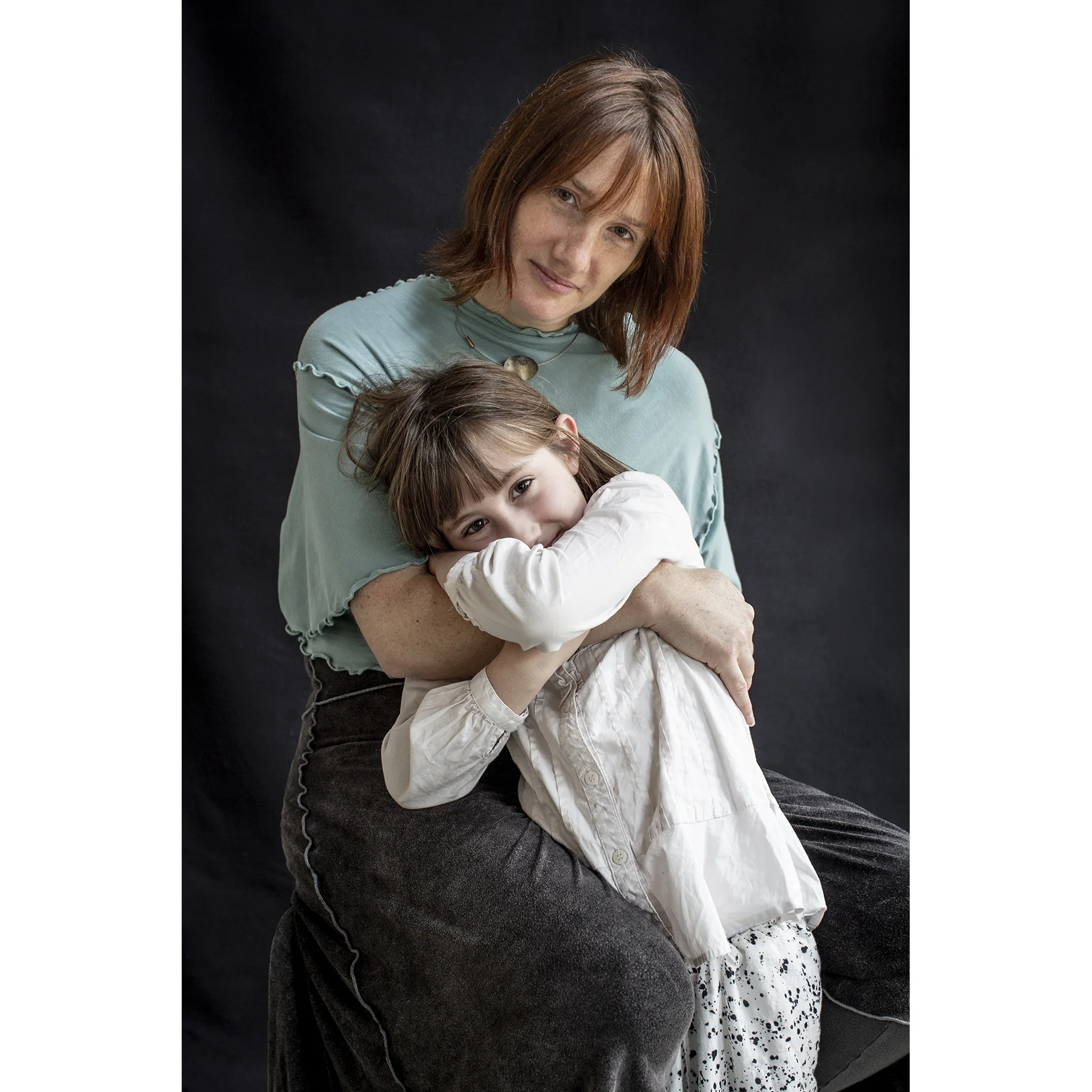Kathleen Capetta (with daughter Ella), Maine
Portrait by Lori Pedrick
Portrait of the woman
as a young girl
There’s a picture of me when I was ten years old that has always captured my attention. I have on khaki shorts, a black t-shirt, and a thick black headband. My hands are in my pockets, and I have this shy but sweet close-lipped smile on my face. It wasn’t a meaningful event—it was a mere moment snapped casually by my mother at the little league field where my older brother was playing. But this picture more than all the others evokes a sense of connection to my inner child, the innocent, sweet, and sensitive spirit at the core of my being.
I had a truly idyllic childhood, one free from trauma and strife. I was loved and cared for thoroughly by my parents and by the extended family of loving adults in my life. I was good at a lot of things, including sports and academics. I had the interpersonal skills to be well liked by adults and by my peers.
The only abusive relationship I’ve endured has been the one with myself.
For decades I have been my own harshest critic, obsessing about my flaws and failures, real and exaggerated. Those flaws and failures have been embedded deep into my psyche and my identity. I was always “too much.” I was too anxious, too shy, too sensitive, too hairy, too freckly, too slutty, too small, too driven, too competitive. When I was told by many women in my life, “you’re too smart for your own good,” it was simply their well-intended, veiled warning that the world is not kind to smart—and especially outspoken—women. Not yet.
So I figured out that if you put yourself down, other people’s words or disapproval can’t hurt you as much. It is in this way that society infiltrates the inner voices of girls and women, disguising very real oppression as self-inflicted. So we build our defenses and we paint our masks and we lose our power.
That’s what the girl in the picture didn’t know yet. When I look at her I feel as though I’m travelling through time, able to viscerally sense the danger of the precipice she doesn’t know she is standing on. When I look at her I feel nauseous with heartache. I want to warn her of her angst yet to come. I want to heal her future, and, more importantly now, my daughter’s.
I only began to understand the insidious origin of this critical voice when I became a mother. I only began to understand that I could control that voice when I went through the arduous self-transformation of pregnancy and roared my way through childbirth and exhaustedly clawed my way through new motherhood. Only then was I infused with my own raw power. Then, unexpectedly, my internal critical voice became an external one emanating from the tiny mouth of my seven-year-old daughter.
A few months ago, after having a tantrum about something and being harshly scolded by me, my daughter started crying. Then she said, eyes looking up at me welled with tears, “I’m just a horrible person. I’m stupid. I’m stupid. I’m stupid.” I froze in my tracks. I recognized that voice, the one I’ve battled since a few years after that picture at the ball field was taken. My first instinct was to blame myself—I must have uttered self-deprecating words within earshot of her. Quickly, compassion and protectiveness swelled inside me. I held her tight and told her to banish that negative inner voice, to never let it get a footing, and to never, ever believe it. Then I cried right along with her.
Together we dance a delicate dance, passing in our divergent trajectories—her to self-conscious young womanhood and me to the confidence that accompanies middle age. She is still young, defenseless, tender, and vulnerable. She is still steeped in innocent sensitivity—and she feels everything deeply. Each day I am painfully bearing witness to her attempt to protect herself from a world that discourages her sensitive spirit. She is building her shell while I am trying to deconstruct my own.
I think about the girl in the picture often these days. I had to grown up to begin finding my way back to that girl. I hear her voice more clearly now and some days that voice is stronger than the critical one. Meanwhile I try to encourage my daughter, the little girl right in front of me who is standing on that same precipice, to understand the difference between the two and to strengthen her true voice. If only she could see through my grown up eyes what I see now when I look at her and the picture of my younger self: it is in our sensitivity and vulnerability where her true beauty and strength lie.
—Kathleen Capetta

